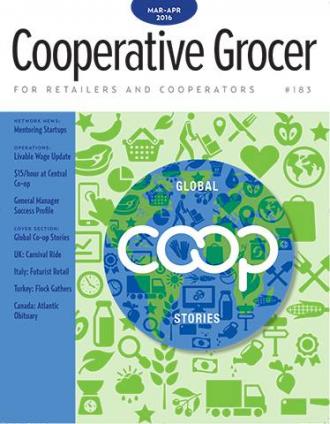Global Stories, Seeking Happy Endings


There is a world of cooperatives out there, inevitably full of both potential and problems. International reports highlight important challenges to major cooperatives and the cooperative movement itself—very few of these stories have made the domestic news. We cover a cooperative obituary in Maritime Canada and cooperative setbacks in the U.K., but more forward-looking examples from Coop Italia and the International Cooperative Alliance.
The other major topic this time is co-op jobs, with new reports and guidelines on livable wage, $15/hour base pay, and a general manager success profile—thoughtful responses to challenging labor and market constraints.
Failure? Forward!
Contrary to much bluster, failure in business enterprise is indeed an option. Failure can also be a learning point.
I am pained to contemplate the demise of Co-op Atlantic—many cooperators have visited there or know some of its long history as a major consumer/farmer federation. Tom Webb’s report examines several strategic decisions behind its decline while operating in an increasingly competitive market. In grocery, the largest of Co-op Atlantic’s several divisions, its small co-op members did not hold up well against larger stores and better-capitalized competition.
Additional recent studies on large co-op struggles similarly emphasize the impact of competitive market environments and unstable economies, as well as dubious management leadership. In the face of such challenges, united cooperatives and strong strategic planning are needed—but are not always realized. Several international examples demonstrate that operating cooperatives successfully at large scale is often achieved but not always sustained. (For more on these large co-ops, see comments and the links in my “Endcap” note on “Board Challenges and Co-op Failures,” at www.grocer.coop.)
The U.K. Co-operative Group would seem to be a prime example of management misdirection within a previously successful consumer cooperative—the largest such co-op in the world. However, I infer from the story a further general lesson: the co-op’s leadership was infected with the contemporary virus that finances ever-greater expansion through increasing debt. (As I write, today’s headline: “Trillions in Bad Loans May Sap World Economy for a Long Time”—NYT, 2/03/16.) The Co-operative Group endorsed the notion that continually becoming larger is necessary because with it the enterprise can meet increasing debt obligations to external lenders while also realizing a cooperative mission of service to member-owners. Unfortunately, the co-op’s household member capital requirement was a pittance—more debt but not more equity is a weak cooperative capital strategy.
Co-op failures have the additional impact of making it less likely that our democratic and service-driven methods for conducting business and meeting social needs will be given due recognition. If co-ops are to achieve the strength that makes larger influence possible, they have to be both strong business operators and strong social enterprises—well managed, accountably governed, and generating ongoing owner and community participation. When cooperatives in specific sectors and as a whole do demonstrate success and influence, they are also enhancing social solidarity.
We’re a long way from the vision of cooperatives being the “acknowledged leader in economic, social, and environmental sustainability”—words from the International Cooperative Alliance Cooperative Blueprint: Towards 2020. There is no doubt that the world faces common threats to sustainability, although manifested very unequally. Cooperatives—internationally comprising millions of organizations—face these same threats. Given the very uneven global development of cooperatives, they appear to be both better structured for democratic solutions and inadequately prepared to operate with a greatly wider scope.
Meanwhile, the world at large is moving in two contrary directions: toward greater recognition of common sustainability needs and, contrarily, toward increased disunity, disparity, and decline. We all hope for fair approaches to global problems, and cooperatives are among the needed tools. But a position based on U.S. dollar debts and military domination, although still protected, is unsustainable and needs replacing. I leave it to the reader to surmise which elements are stronger today, from a global perspective.
Sustainability—which is to say, survival—will require breaking with the unsustainable and doing things differently. Among the best approaches, cooperatives will be key if we learn to expand upon our present impacts.







